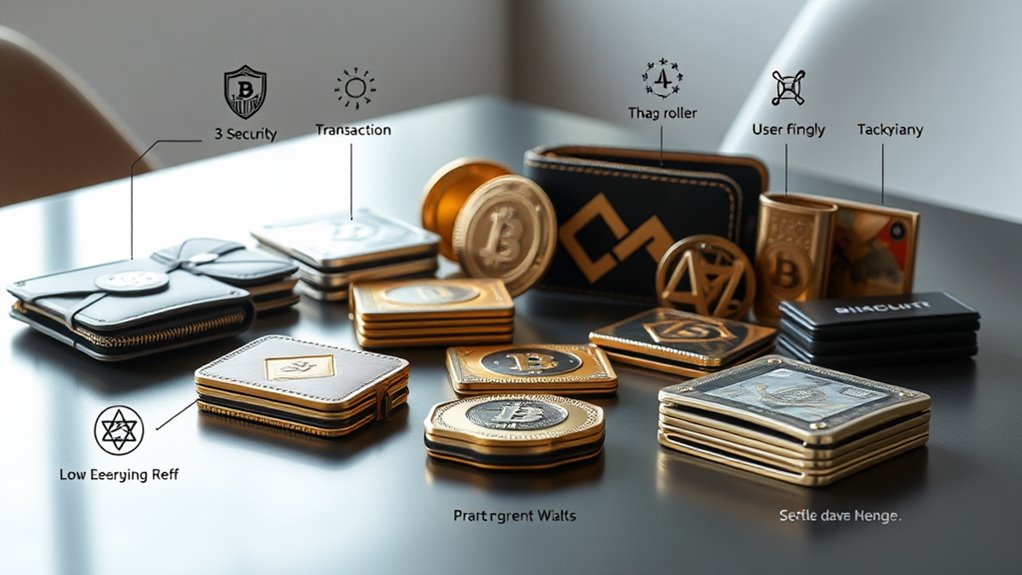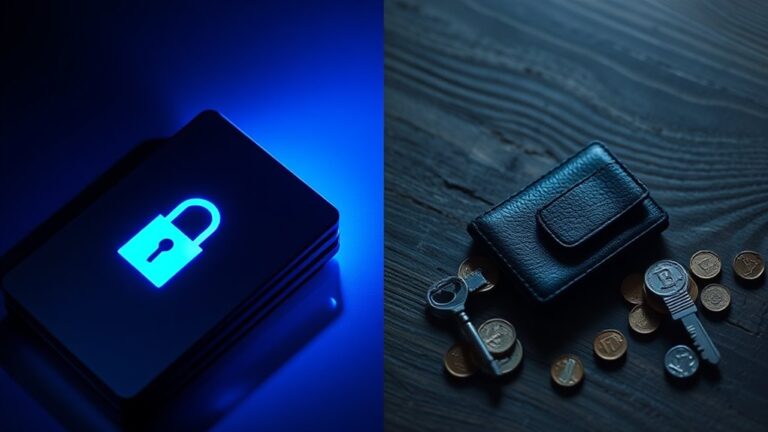
Top Multi-Currency Crypto Wallets: What Are the Best Options for You?
Multi-currency crypto wallets are essential for managing diverse digital assets. Popular options include Exodus, Coinbase, Crypto.com, Trust Wallet, and Zengo. These wallets vary in features like security protocols and supported cryptocurrencies. Users can choose between hot, cold, and hybrid wallets based on their needs. Security features like encryption, two-factor authentication, and multi-signature verification enhance user safety. Understanding these elements helps users select the best wallet for their trading style. A further exploration reveals more essential insights.
Key Takeaways
- Exodus Wallet supports over 260 cryptocurrencies, offering a user-friendly interface and staking options for passive income.
- Coinbase Wallet emphasizes robust security, integrating seamlessly with DeFi protocols for enhanced functionality.
- Crypto.com Wallet provides access to over 250 cryptocurrencies, featuring competitive fees and investment opportunities.
- Trust Wallet, affiliated with Binance, supports a vast range of cryptocurrencies and allows for easy token swaps.
- Zengo Wallet utilizes multi-party computation technology for superior security, making it a solid choice for secure asset management.
Understanding Multi-Currency Wallets

Understanding multi-currency wallets is essential for anyone looking to manage a diverse range of digital assets effectively. These wallets support various cryptocurrencies, simplifying the management of different digital assets in one location.
They integrate multiple blockchain networks, allowing for cross-chain transactions and efficient oversight. Security is a primary focus, with features such as encryption, multi-signature verification, and two-factor authentication to protect users’ funds. Additionally, the user interface is designed for ease of use, facilitating streamlined transactions. Operating on decentralized networks grants users greater control and independence over their assets. Many users also appreciate the choice between custodial and noncustodial wallets, which influences how they manage their private keys and overall security.
Types of Multi-Currency Wallets Explained

Multi-currency wallets come in various types, each designed to meet different user needs and preferences.
Custodial wallets are managed by third parties, often linked to centralized exchanges, while non-custodial wallets allow users to control their private keys.
Hot wallets are software-based and continuously connected to the internet, making them convenient but potentially vulnerable to attacks.
In contrast, cold wallets are hardware-based and kept offline, providing enhanced security.
Hybrid wallets combine features of both hot and cold wallets, offering flexibility.
Additionally, software wallets can be accessed on multiple platforms, while hardware wallets guarantee physical security for substantial holdings, making them ideal for serious investors. Ultimately, the choice between these wallet types depends on individual needs, with many opting for a combination of both to balance convenience and security.
Each type serves distinct purposes, catering to varying levels of security and convenience.
Popular Multi-Currency Wallets Overview

The landscape of popular multi-currency wallets is diverse, reflecting the varied needs of cryptocurrency users. Each wallet offers unique features tailored to different preferences and requirements.
- Exodus Wallet: Supports over 260 cryptocurrencies and offers staking options.
- Coinbase Wallet: Provides robust security and integrates with decentralized finance protocols.
- Crypto.com Wallet: Allows investment in over 250 different coins.
- Trust Wallet: Affiliated with Binance and supports a wide range of cryptocurrencies.
- Zengo Wallet: Utilizes MPC technology for enhanced security.
These wallets cater to users looking for flexibility, investment opportunities, and integration with various platforms, making them suitable for both novices and experienced investors. Additionally, many of these wallets also provide staking options that enable users to earn passive income through their crypto assets.
Key Security Features to Consider

When considering the security features of multi-currency crypto wallets, several key aspects are vital to guarantee robust protection.
Encryption methods safeguard private keys, making them unreadable to unauthorized users, while effective private key management is critical for preventing loss or theft.
Additionally, the importance of two-factor authentication cannot be overstated, as it adds an extra layer of security by requiring users to verify their identity through multiple means. Implementing strong, unique passwords is also essential to further enhance the security of your wallet against unauthorized access.
Encryption Methods Overview
In today’s digital landscape, a variety of encryption methods play an essential role in securing multi-currency crypto wallets.
These methods are vital for protecting user assets and ensuring safe transactions. Users should consider the following key encryption features:
- End-to-End Encryption: Secures data from sender to receiver.
- State-of-the-Art Algorithms: Utilizes advanced algorithms to thwart unauthorized access.
- Data Encoding: Prevents unauthorized access to sensitive information.
- Security Layers: Implements multi-layered encryption for added security.
- Off-Chain Storage: Keeps private keys offline to safeguard against online threats.
Additionally, understanding the importance of secure wallets helps users select a wallet that best fits their security needs and protects their investments effectively.
Private Key Management
Private key management is a fundamental aspect of securing multi-currency crypto wallets, building upon the importance of encryption methods previously discussed. Effective management involves generating secure keys, storing them safely, and minimizing risks.
| Key Generation | Key Storage | Security Risks |
|---|---|---|
| 256-bit length | Hardware wallets | Key theft |
| Randomly generated | Software wallets | Data breaches |
| Mathematically derived | Paper wallets | Physical risks |
| Automated by software | Seed phrases | Software vulnerabilities |
Best practices include backing up keys regularly, using offline storage, and concealing private keys. Additionally, implementing multi-signature protection can further enhance security, safeguarding against potential threats to digital assets. Choosing reputable wallets and ensuring they support multi-asset features can enhance overall security, safeguarding against potential threats to digital assets.
Two-Factor Authentication Importance
Two-Factor Authentication (2FA) plays an important role in securing cryptocurrency accounts, providing an additional layer of protection that is crucial in today’s digital landscape.
This security measure enhances account safety, particularly given the high incidence of cyberattacks targeting cryptocurrencies.
Key benefits of 2FA include:
- Layers of Protection: Adds extra security beyond passwords.
- Thwarting Phishing Attacks: Requires two forms of identification.
- Complicating Unauthorized Access: Difficult for attackers with only a password.
- Enhanced Trust: Builds confidence among users.
- Reducing Target Vulnerability: essential for high-risk platforms like exchanges.
Additionally, the use of multisig wallets can further bolster security by requiring multiple signatures for transaction authorization.
Enhancing User Experience and Interface

How can a well-designed user interface greatly enhance the experience of multi-currency crypto wallet users? An intuitive interface guarantees clear navigation, allowing users to locate wallet features effortlessly.
Customizable elements, such as dark/light modes, boost personalization, improving satisfaction. Responsive layouts adapt to various devices, enhancing accessibility, while real-time updates on balances and transactions keep users informed.
Consistent branding fosters trust and recognition. Cross-platform functionality is crucial, providing users with seamless access across mobile, desktop, and web platforms. This consistency boosts user retention, as syncing capabilities allow for effective asset management across devices. By prioritizing these design elements, wallets can markedly enhance user experience, making cryptocurrency management more straightforward and engaging for everyone. Additionally, wallets like Coinbase Wallet support a vast array of digital assets, further enriching the user experience.
Essential Features for Choosing the Right Wallet

Selecting the right multi-currency crypto wallet involves understanding a variety of features that contribute to security, usability, and functionality.
When evaluating options, users should consider the following essential features:
- Encryption: Protects user data and transactions through secure coding.
- Two-Factor Authentication (2FA): Adds an extra layer of verification to prevent unauthorized access.
- Multi-Signature Authorization: Requires multiple approvals for transactions, beneficial for businesses.
- Diverse Cryptocurrency Handling: Allows storage and management of various cryptocurrencies in one wallet.
- Instant Currency Conversion: Facilitates quick exchanges between cryptocurrencies.
Additionally, it’s important to choose a wallet that effectively manages private and public keys, as they are essential for making transactions on the blockchain network.
Comparing Hot, Cold, and Hybrid Wallets

When comparing hot, cold, and hybrid wallets, the primary considerations include security versus convenience, specific use cases, and cost.
Hot wallets offer quick access for frequent transactions but carry higher security risks, while cold wallets prioritize safety for long-term asset storage.
Hybrid wallets provide a middle ground, allowing users to enjoy both the convenience of hot wallets and the security of cold wallets, making them suitable for various trading styles and asset values. Additionally, understanding the role of private keys is essential for managing your cryptocurrencies securely.
Security vs. Convenience
In the domain of cryptocurrency, the balance between security and convenience is a critical consideration for users when choosing a wallet. Each type of wallet—hot, cold, and hybrid—offers unique advantages and drawbacks.
- Hot Wallets: Easily accessible but more vulnerable to hacks.
- Cold Wallets: Highly secure by storing keys offline, yet less convenient for quick transactions.
- Hybrid Wallets: Combine features of both, offering flexibility and improved security.
- User Control: Cold wallets allow non-custodial control, while hot wallets often rely on third parties.
- Cost: Hybrid wallets can be budget-friendly, appealing to a wider audience.
Understanding these differences helps users make informed decisions based on their specific security and convenience needs.
Use Cases Explained
Understanding the distinct use cases for hot, cold, and hybrid wallets can greatly influence a user’s choice in managing their cryptocurrency assets.
Hot wallets, such as Trust Wallet, excel in convenience and are ideal for daily transactions and DApp interactions, but they carry higher security risks due to their online nature.
In contrast, cold wallets, like Ledger and Trezor, prioritize security, making them suitable for long-term storage, as they remain offline and protect against cyber threats.
Hybrid wallets, exemplified by SafePal, combine features of both types, offering users flexibility and added security with offline capabilities while maintaining user-friendly access.
Each type serves different needs, catering to varying security and accessibility preferences.
Cost Considerations
Cost considerations play a crucial role in selecting the appropriate cryptocurrency wallet, as users must evaluate the financial implications of each type.
Different wallet types come with varying costs that can impact a user’s decision. Key factors include:
- Initial purchase price for hardware wallets (e.g., Ledger, Trezor).
- Transaction fees associated with hot wallets, which may vary by network.
- Maintenance costs, including software updates and backups.
- Security features, with hardware wallets offering premium security at a higher cost.
- Long-term investment costs, where cold storage provides security but requires a higher upfront investment.
Understanding these aspects helps users make informed decisions about which wallet best suits their financial and security needs.
The Future of Multi-Currency Wallets

As the cryptocurrency landscape continues to evolve, the future of multi-currency wallets appears promising and dynamic. The market for these wallets is expected to grow considerably, with a projected value of $8.42 billion in 2022 and a 24.8% CAGR through 2030.
As the number of cryptocurrencies exceeds 20,000, these wallets will increasingly offer efficient management options. Future developments include advanced security features like biometric verification and AI-driven fraud detection, ensuring user safety.
Additionally, cross-chain functionality will enhance transaction capabilities across different blockchain networks. User-friendly interfaces will simplify navigation, while integration with decentralized finance (DeFi) and NFT storage will broaden their utility, making multi-currency wallets integral to the evolving digital finance ecosystem.
Frequently Asked Questions
Can I Recover My Wallet if I Lose My Device?
If someone loses their device, wallet recovery is often possible using the seed phrase. For hardware wallets, this guarantees access can be restored, although recovery without the seed phrase is much more challenging and complex.
How Do I Safely Transfer Assets Between Wallets?
To safely transfer assets between wallets, one should verify recipient addresses, conduct test transactions, utilize secure wallets, and safeguard private keys. Regular updates and vigilance against phishing also enhance security throughout the transfer process.
What Happens if a Wallet Goes Out of Business?
If a wallet goes out of business, users may face challenges reclaiming their assets, as they could become part of the bankruptcy estate. Legal complexities and state laws further complicate ownership and recovery efforts for customers.
Are There Any Tax Implications for Using Crypto Wallets?
“Nothing is certain but death and taxes.” Crypto wallet users face tax implications from transactions, capital gains, and new regulations requiring meticulous record-keeping. Understanding these nuances is essential for effective tax management and compliance.
How Do I Keep My Wallet Software Updated?
To keep wallet software updated, users should enable automatic updates or periodically check for manual updates. Regular backups, compatibility checks, and following official guides guarantee secure and effective updating processes for both software and hardware wallets.
Conclusion
To sum up, selecting the right multi-currency crypto wallet involves understanding individual needs and preferences. Users should consider security features, usability, and essential functions that align with their goals. By comparing hot, cold, and hybrid options, individuals can make informed choices. As the cryptocurrency landscape continues to evolve, staying updated on wallet advancements will enhance user experiences. Ultimately, the best wallet is one that balances security, accessibility, and functionality, catering to the diverse needs of cryptocurrency users.














